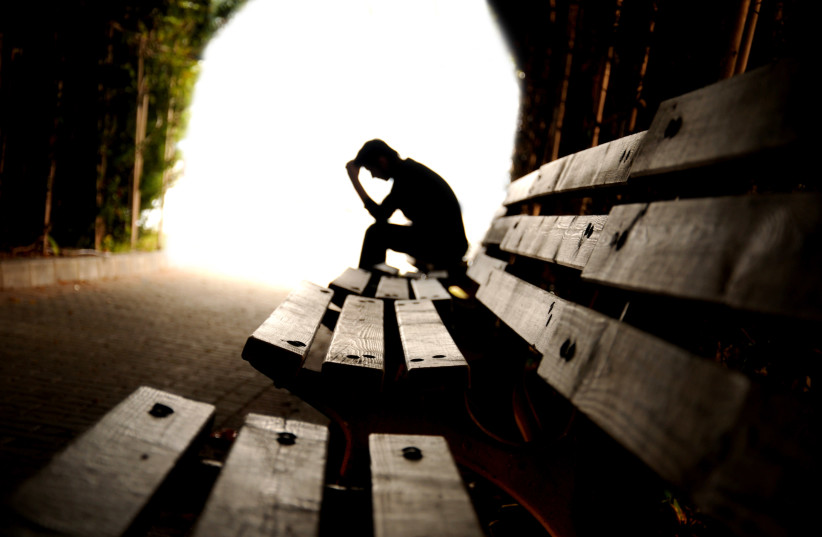More than half of Israelis suffering from psychological problems after the October 7 massacre say they don’t have the financial means for mental health care, and more than a quarter reported that they don’t receive psychological assistance due to a lack of therapists where they live.
The University of Haifa and the Shalvata Mental Health Center in Hod Hasharon conducted a joint study showing that the lack of money to get mental health care was the complaint of 53.3% of the participants in the Jewish population and 56.1% in the Arab population. About a quarter of the participants from among the Jewish population and about half of those from the Arab population said they don’t get help due to a lack of caregivers in their area of residence.
The study also found that 15% of the Jewish population and 12% of the Arab population suffer from significant symptoms of post-traumatic stress disorder (PTSD) after October 7, compared to about 9% among the entire population of Israel who suffered from PTSD before the war.
“The increase in the number of people suffering from post-traumatic stress disorder means [there are] hundreds of thousands of Israelis who are now in need of assistance,” the researchers said. “The large number of those who reported that they did not receive assistance due to a lack of financial means or inaccessibility indicates the need for massive government investment to expand treatment options for everyone who needs mental help following the situation.”
The research was conducted by Dr. Yael Anav and Dr. Yael Mayer from the university’s Faculty of Education, together with Dr. Ido Luria from Shalvata and Dr. Noga Shipman from Bnei Brak’s Ma’yanei Hayeshua Medical Center.

PRELIMINARY ANALYSES of the 517 participants who constitute a representative sample of the entire adult population here found that 15% of the Jewish population suffer from PTSD symptoms above the clinical threshold, as well as 12% of the Arab population.
It was also found that 25% of Jews and 20% of Arabs suffered from a minimal level of anxiety, and 35% of Jews and 40% of Arabs experienced a low level, which is a common level among both sectors. Fully 20% of the Jewish population and 25% of the Arab population suffered from a moderate level of anxiety, while 20% and 15% of the Jewish and Arab populations, respectively, suffered from a high level of anxiety.
Source of the distress
When the participants were openly asked what the source of their distress was, among the reasons for anxiety and mental distress, the participants indicated the following reasons as the most central – their concern for the abductees, a sense of uncertainty, loss of income and financial worries, concern for the soldiers and their safety and the current news about casualties.
“The findings of the study indicate the severe and widespread psychological effects caused by the events of the war,” the authors wrote. “The increase in psychological distress is related in particular to the issue of the abducted and murdered, the feeling of general uncertainty, and the economic damage. Although it is expected that some of the symptoms of anxiety will pass over time, many will need mental care, and comprehensive assessments are required of the health, education, and welfare system to provide suitable responses.”
The healthcare system now needs a massive investment to provide the psychological treatment required for the general public, the authors wrote. “In particular, care must be taken to help the more sensitive populations that are likely to be more harmed, such as people who experienced the terrorist events first hand or second hand; those who experienced the loss of family members; children and teens facing psychological difficulties or those with a traumatic past; or people facing economic difficulties whose difficulties will be exacerbated by the war,” the researchers said.
THE STUDY even points to the gap between people who would like to receive mental help and those who receive it – partly because of stigma about receiving psychological help but mainly because of economic hardship or a lack of accessible services in their area. Overall, the number of people seeking mental help among Arab and Jewish society is similar – 10% of the total population. Among the Jewish population, 13% of them answered that despite their desire for help, they didn’t get it; fully 32% of the Arab population who wanted help said they didn’t receive it.
On the other hand, the participants also described the resilience factors that help them in this difficult time. Many mentioned the solidarity and sense of mutual responsibility in the nation, the sense of belonging and shared destiny, faith, and hope, engaging in volunteering and giving, receiving support from family and friends, raising children and grandchildren, engaging in sports, music or caring for pets, and maintaining the routine of life
“It is important to remember that even in the most difficult times, the human soul has enormous powers to cope. During this period, many people also discover the strength of their soul and that of their communities, among them a sense of belonging to society and family, a sense of meaning in voluntary work, and a mutual guarantee of contribution and giving,” the study said.
“It is important in such times to also emphasize the resilience in Israeli society, the strength, and coping resources, to empower communities, and also strengthen the hope for change which is a key component in the recovery of societies from situations of mass trauma,” the researchers concluded.
